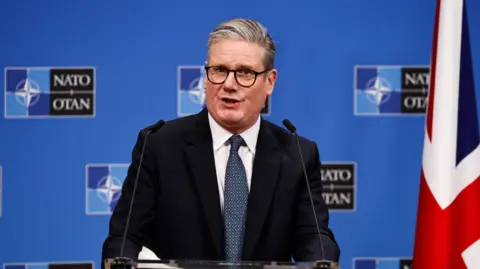Political reporter
 EPA
EPAThe UK is “not choosing between the US and the EU”, Prime Minister Sir Keir Starmer has said after President Donald Trump threatened the European Union with trade tariffs.
Over the weekend, Trump announced 25% tariffs on Canada and Mexico, and said he would take similar action against the EU but suggested a deal could be “worked out” with the UK.
Asked if he would be willing to water down attempts to forge closer ties with the EU in exchange for keeping the US on side, Sir Keir said both relationships were important to the UK.
“Now, that for me isn’t new, I think that’s always been the case and will be the case for many, many years to come,” he added.
The prime minister told a press conference in Brussels it was “early days” when it came to tariff talks with the US and that he backed “open and strong trading relations”.
Sir Keir was in Belgium to meet the Nato secretary general Mark Rutte and will later attend talks with EU leaders – the first PM to do so since Brexit.
The focus of the trip is defence and security co-operation, however for Sir Keir it is also part of an ongoing bid to “reset” UK-EU relations in areas such as trade.
The UK government wants to forge stronger links with the EU but that could anger the US and risk the UK getting caught up in a trade war. Similarly the EU might object to Sir Keir siding with the US rather than its European neighbours.
Earlier, No 10 said the prime minister trusted Trump and pointed to “a really constructive early set of conversations” between the two men.
“We’ve got a fair and balanced trading relationship which benefits both sides of the Atlantic,” the spokesman added.
“It’s worth around £300bn and we are each other’s single largest investors, with £1.2tn invested in each other’s economies.”
Following Trump’s tariffs announcements over the weekend, European and Asian stock markets fell, with car manufacturers particularly badly hit.
The UK was also impacted but to a lesser effect than the EU.
Analysis produced last year by the University of Sussex suggested the UK could face a £22bn hit to exports if the US imposed a blanket 20% tariff on all imports.
The top goods exported from the UK to the US include cars, medicinal and pharmaceutical products and mechanical power generators.
Trump believes imposing tariffs will help grow the US economy and protect jobs, however it could lead to consumers paying more as prices adjust to the taxes.
On Monday, Mexican President Claudia Sheinbaum said the imposition of the 25% tariffs had been delayed after reaching an agreement with the US which would see her country deploy 10,000 troops to tackle drug trafficking into the US.
However, other countries responded angrily with Canada immediately announcing retaliatory tariffs of 25%.
French President Emmanuel Macron said that if EU interests were attacked, the trading bloc would have to “make itself respected and thus react”.
EU foreign policy chief Kaja Kallas said: “There are no winners in trade wars.”
If there is a trade war with the US, “then the one laughing on the side is China”, she added.
Asked if he would put tariffs on the UK, President Tump said: “UK is out of line but I’m sure that one… I think that one can be worked out.”
He added that his discussions with the British prime minister had “been very nice” adding: “We’ve had a couple of meetings. We’ve had numerous phone calls. We’re getting along very well.”
While the focus of the Brussels summit is defence, the UK also wants to discuss easing restrictions on the trade of food and animal products and cooperation on emission trading schemes.
The mutual recognition of professional qualifications and allowing touring musicians to travel more easily are also areas of interest.
The EU is keen to set up a youth mobility scheme, which would make it easier for young EU citizens to study and work in the UK and vice versa. However, ministers have so far rejected the idea.
Downing Street has not ruled out joining the Pan-Euro-Mediterranean Convention, which would allow tariff-free trade on some goods.
The Conservatives have accused the government of “trying to reopen the divisions of the past and edge us back into the EU”.
In contrast, Liberal Democrat leader Sir Ed Davey has been urging the government to negotiate a new UK-EU customs union, allowing tariff-free trade between the two sides.


